Feed your body with cultured food and have a healthy lifestyle. We have been taught that bacteria is bad. However, we don’t realize that every one of us is made of bacteria. It is what keeps us well each day.
Donna Schwenk is a cultured food expert and author of the two best-selling books, Cultured Food for Life and Cultured Food for Health. In this episode, she shares how cultured food changed everything for her and her family. She educates us on how important it is to integrate cultured food into our meals. She shares how cultured food will change not only our bodies but our entire lives.
Table of Contents
Key Takeaways
- Cultured foods were a way for people to preserve their food and keep it safe when refrigeration was not available many years ago.
- Cultured foods are not heated. They preserve the probiotics in them.
- Cultured foods have billions and billions of microorganisms that enhance the vitamins that are in the food.
- We are all made of a hundred trillion bacteria that are mostly keeping us well. Ninety-nine percent of the bacteria inside us is healthy or harmless; without it, we wouldn’t even be able to breathe.
- Eating cultured foods enhances these bacteria and allows your body to do the many things it’s supposed to do.
- Cultured foods have many good bacteria that keep pathogens and the environment safe.
- Botulism is a scientific impossibility when you’re culturing vegetables.
- Cultured foods are epic foods. They go beyond superfoods because they have these living organisms.
- Different strains of bacteria set up these little camps; they need large numbers to grow, multiply, and do their job.
- 50% of your detoxification is happening in your gut with your hormones. Your body is detoxing itself through the gut.
- Bacteria is an intelligence that communicates with the brain to tell you how to respond to things.
- You don’t need to eat massive amounts of cultured food.
- You have to feed the strains of bacteria prebiotic foods, which are fruits and vegetables, not seeds and grains, oaks, or legumes.
- Bacteria feed on that fiber that we can’t digest and grow and multiply.
- The prebiotic foods are just as important as the probiotic foods.
- Probiotic foods give you the strains that many of us have killed through antibiotic use, or even diet can kill like high-processed foods.
- Prebiotics to make bacteria strains grow:
- A cup or two of Kefir a day
- A few spoonfuls or half a cup of krauts
- 8-16 oz of Kombucha fermented tea
- It’s not true that you need to drink Kombucha or Kefir with food.
- Kombucha contains a special bacteria called Saccharomyces boulardii, which is one of the most researched and strongest probiotics in the world today.
- Kombucha works so well because coats the intestinal lining and keeps out pathogens. It acts like a pathogen and attracts pathogens to it. When the pathogen gets to it, it kills it.
- Antibiotics cannot kill Kombucha.
- Kombucha only lasts in the body for 2-3 days.
- Kefir is also known as the champagne of yogurt. It takes 5 minutes to make it.
- To make cultured vegetables:
- First, you need to chop vegetables.
- Then, put them in a jar.
- Next, cover it with water.
- Put it in a culture.
- Let it ferment.
- Lastly, stick them in the fridge for up to 9 months.
- Cultured foods last long in your fridge because they’re preserved; when you eat them, they preserve you.
- When you have a baby and you’re nursing, you should eat cultured foods, and your baby will get it.
- This is not just about you getting healthy; it is about affecting the world around you because as you ingest these foods and get healthier, you take them with you and give them to the people surrounding you.
- The immune system destroys viruses and pathogens that enter your body, but only if you feed and care for it.
- Some benefits of eating cultured foods:
- Can cure food allergies and asthma
- Normalize blood sugar
- Improve kidney functions
- Boosts immunity
- Bacteria are in us for a reason. They’re here to help us live healthy lives as long as we take care of them.
- When bacteria eat fiber, they grow and multiply, reducing blood sugar and inflammation, which makes you less hungry.
- Changing what you eat will not just change your body. It will change your entire life because you feel good. When you feel good, you do good and change everybody around you.
Transcription: Cultured Food – Interview With Donna Schwenk
Here is the transcript from the interview with Donna Schwenk about cultured food.
What Is Cultured Food?
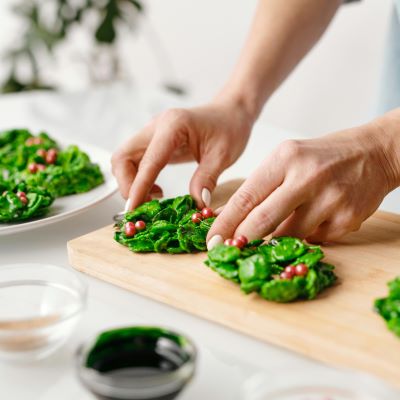
Kamala Chambers
Can one little tablespoon change your life? We will talk about cultured food and how adding a little bit to your daily meals can boost your immune system. We will also talk about how it strengthens the mind and sets you on track for emotional stability.
Luis Congdon
Today, we’ll be speaking with Donna Schwenk, Cultured Food expert. She’s the author of the two best-selling books, Cultured Food for Life and Cultured Food for Health. She helped her daughter overcome illness and sickness using cultured food. She’s been helping people around the globe utilize cultured food in a way that most of us would be astounded by.
We all need to listen to today’s episode to have more health and vitality with Donna Schwenk of Cultured Food Life.
Kamala Chambers
Hey, Donna, are you ready to launch?
Donna Schwenk
I am. Thank you for having me.
Kamala Chambers
It’s so great to have you here. This is a different kind of interview for us, and it’s near and dear to my heart, as I have a background in nutrition. I would love for you to lay the foundation. What are cultured foods?
Donna Schwenk
Cultured food has been around for millenniums. They were a way for people to preserve their food and keep it safe when they didn’t have refrigeration for many years ago. There are things like yogurts, cheeses, and things like that.
However, today, many of these foods, like pickles and sauerkraut, are all cans and heated. But these preventive foods I talk about are cultured and not heated. They preserve the probiotics in them. They’re not made with vinegar, and they have billions and billions of microorganisms that enhance the vitamins that are in the food.
Cultured Food For Life
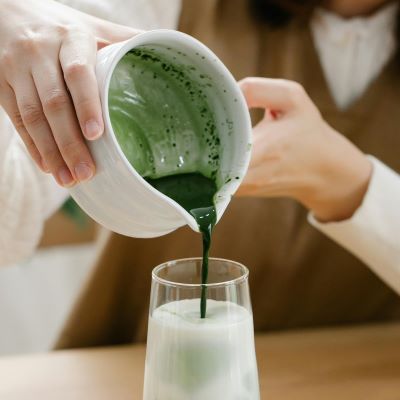
Donna Schwenk
For instance, in sauerkrauts, naturally, cabbage has about 50 milligrams of vitamin C. When you ferment it and put probiotics in it and it cultures, you get 700 milligrams of vitamin C. That’s through the alchemy of fermentation, and what that does when you eat it inside the body is extraordinary. Because you and I are a hundred trillion bacteria, eating these foods enhances that. It also allows your body to do the many things it’s supposed to do.
Luis Congdon
I think about foods that have been sitting around for a while and are fermenting. Then I’m supposed to eat them. I have a natural repulsion. I know it took me a while to get brave enough or courageous enough to eat cultured foods, and they’re not so bad. But at first, it was hard for me to eat them.
You see this glass jar that you can buy. Or you can do it yourself and these foods, they’re living, yeah?
Donna Schwenk
Yeah. We have been trained to think that.
Here’s what’s happened: Everybody thinks that bacteria is bad. We’ve just been trained that way. There are antibiotics and antibacterial soaps.
What we don’t realize is that you and I are made up of a hundred trillion bacteria that are mostly keeping us well. Ninety-nine percent of the bacteria inside you is healthy or harmless; without it, you wouldn’t even be able to breathe. It’s keeping you well every day.
It does an unbelievable amount of extraordinary things inside the body. We don’t know or understand what it’s doing.
Cultured Food Contains Good Bacteria
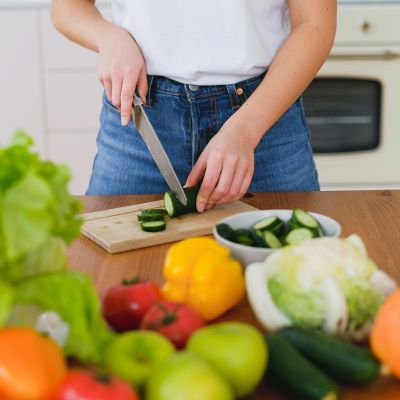
Donna Schwenk
Let’s say cultured foods have vegetables, for instance. There’s so much good bacteria in there that it dominates. It keeps out pathogens and keeps the environment safe so harmful things can’t happen.
Botulism is a scientific impossibility when you’re culturing vegetables. And that’s what is so cool about it, is that it makes the food safer than even raw food. This is because of the large amount of good bacteria that’s contained within them.
Kamala Chambers
I’d love to hear a little bit more from you about the effects of cultured foods on the mind.
How does that affect mental focus?
Luis Congdon
As you talked about these foods, I got this image of a cabbage with a cape, and it’s a superfood. Is it okay to refer to cultured foods as superfoods?
Donna Schwenk
Oh yeah. I call them epic foods. They go beyond superfoods because they have these living organisms.
There’s more bacteria inside of you than in the Milky Way galaxy. And what it does is that they set up these little camps. Different strains of bacteria set up these little camps, and they need numbers. They need large numbers to grow and multiply and do their job. They reduce inflammation. They keep your blood sugar stable. They help to make these chemicals in your gut that go to the brain and keep you calm.
Effects Of Cultured Food
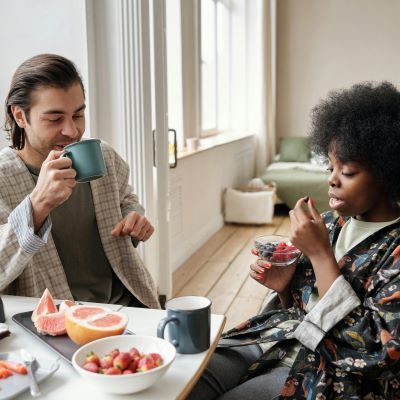
Donna Schwenk
As you said before, how does it affect your emotions? It hugely affects your emotions. It’s so important that they are starting in psychology. And all kinds of things to try to get probiotics that help calm you down. Because 50% of your detoxification is happening in your gut with your hormones. Your body detoxes itself through the gut, and we don’t realize it. We think it’s just the liver.
However, you don’t have the right neurotransmitters when those things get out of whack. Your brain can’t calm you down because your gut’s upset. That’s why they call it the second brain. There’s a thing called a Vagus nerve, which goes from the gut up to the brain.
Bacteria is actually an intelligence that communicates with the brain to tell you how to respond to things. And we’re not aware of that. We’re not aware of all the things the bacteria do. But if you and I are a hundred trillion bacteria, and we’re more than anything else, we’re 10x more bacteria than cells in the body.
There’s a reason we’re that way. We just haven’t connected all the dots to understand all the things that bacteria does. Now, science is exploding with research on what bacteria do within the body.
Luis Congdon
So Donna, do you eat more cultured foods than other kinds of foods?
As I hear you talk about this, I’m starting to lead into this idea that we should be eating massive amounts of cultured foods.
Cultured Food Gives You Good Bacteria
Donna Schwenk
That’s a really good question, and no. I do not do that.
Here’s the deal. You don’t need to eat massive amounts of cultured food.
For instance, one spoonful of cultured vegetables could be a fermented or cultured pickle. Or one spoonful of vegetables like sauerkraut has more supplements, has more probiotics. That gives you the strains of bacteria.
Then, you have to feed the strains of bacteria with prebiotic foods and probiotic foods such as fruits and vegetables. Not seeds and grains, oaks, legumes.
There are several prebiotics, and bacteria feed on fiber that we can’t digest, growing and multiplying.
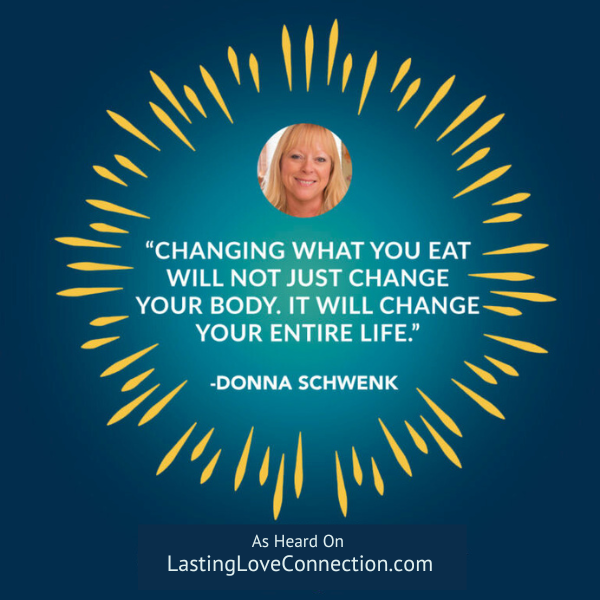
Donna Schwenk
So, the prebiotic foods are just as important as the probiotic foods. Probiotic foods give you the strains many of us have killed through antibiotics or diet. High-processed foods can kill those bacteria, so we put those back in with the cultured foods.
We’re talking about maybe a cup or two of Kefir a day, a few spoonfuls of kraut, or maybe half a cup. I like Kombucha fermented tea, which is about 8 to 16 ounces. That’s plenty. You can have more if you want. It doesn’t matter. Then, there are lots of prebiotics to make those strains grow.
Kamala Chambers
I love the way you laid it out so clearly for everyone. One thing I’ve noticed when drinking Kombucha or Kefir is always drinking it with food. I’ve heard that it helps to keep the bacteria alive when you drink it with food instead of the stomach acid killing them.
Is that true?
Donna Schwenk
No. That’s not true at all.
Cultured Food Strengthens Your Immune System

Donna Schwenk
Now, that’s true with the supplements, but it’s not true with the food. Because food has a protected halo around it, it goes through the body faster, and it’s also protected.
For instance, Kombucha has a special bacteria called Saccharomyces boulardii. It’s one of the most researched and strongest probiotics in the world today. They’re using it a lot at hospitals. This is not necessarily true in the United States but in a lot of European countries. They use it quite profoundly for all kinds of problems, and it works so well. It works well because it coats the intestinal lining and keeps pathogens out. It acts like a pathogen and attracts pathogens to it. When the pathogen gets to it, it kills it.
The cool thing about this bacteria is that it cannot be killed by antibiotics. Because it’s a probiotic yeast, it is so powerful that it can survive antibiotics. The only thing you need to know about this is that it doesn’t last very long in the body—only two to three days.
So you need to have some more tea and don’t have it with food. You can have it by itself. It still works just as well because it’s a food substance. Things go through the body faster when you eat them than they do.
For instance, a pill has to be digested so it sits in the stomach acids, and they usually get killed by the stomach acids. Whereas food doesn’t do that because straight to the parts of the body that are needed. It works so profoundly that you can have it with or without food.
Read More: 5 Ways An Online Marriage Course Mends Relationships
Where To Get Cultured Food
Luis Congdon
Okay. You convinced me that cultured foods are fantastic, and you’ve convinced me I’m okay with trying some foods. They look weird, smell funny, and are different from what other people are eating. However, they’re foods.
You go to a baseball game and eat things that look, smell, and taste like real cultured foods. So you’ve been also great with us in making a distinction about what most people are buying. And what most people taste is not the same thing you’re talking about.
So where would I go and get the real thing?
Donna Schwenk
You can get them at almost any healthy goods store. They’re in the refrigerated sections. They’re not in the can sections. They’re living cultures so they usually need to be refrigerated. If they’re not refrigerated, they’re usually not alive.
It’s Easy To Make Your Own Cultured Food
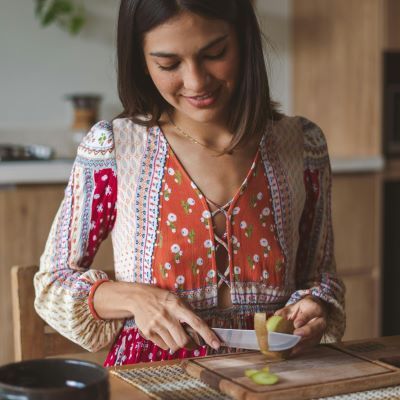
Donna Schwenk
Bacteria need food to stay alive. Putting it in a cooler section slows the bacteria down, allowing it to stay alive longer.
The krauts are in there. You can also find things like Kefir, a fermented drink similar to yogurt. It can be dairy or regular. They both work fantastically. Kombucha tea will be in the refrigerated section. Usually, it’s got its section.
It’s growing so fast that most stores are giving its little section now, and you could also make them. It’s what I teach people to do because it’s a lot less expensive but also a lot of fun. It’s super easy. It’s new to everybody. People think this is hard. They’re going to mess it up like you were. You’re scared about it. It’s not hard. It’s just new. It’s one of the easiest things you can do.
It’s easier than if you want to make your own Kefir, which they call the champagne of yogurt. It takes you 24 hours and 5 minutes to do it. It’s super fun. You can have gallons and gallons of this stuff in your fridge, and the same with the vegetables. They’re just chopping vegetables, putting them in a jar, covering them with water and putting them in a culture, letting to ferment, do their thing. And then, stick them in the fridge where they’ll last like 9 months.
It’s the same with the vegetables you can buy at the store.
Cultured foods last a long time in your fridge because they’re preserved, and when you eat them, they preserve you.
Kamala Chambers
Yeah.
We used to have these big parties where everybody would bring organic vegetables. We chopped them all up, and then we made up to 11 gallons of cultured vegetables one time. It was a great way to do it,, and then we cultured vegetables all winter.
Luis Congdon
I’m curious: is it healthy to give young babies, young children, and our kids? Is this a healthy thing for kids to be consuming as well?
Is Cultured Food Healthy For Young Kids?

Donna Schwenk
This is really where I started with my daughter.
She was born prematurely, 8 weeks, and I was sick, and she was sick. It was my effort to help her. I would give her spoonfuls every day, and I watched her transform in a month. I couldn’t believe she went from A to Z in just a month, and that was a real wake-up call for me.
So I began to eat them, and then I changed, and it just went from there because all of us are bacteria. If you have a baby and you’re nursing, you should eat them, and they’ll get them. It’s the greatest thing in the world. As you said, more healthy bacteria are a foundation for your child; they change everything.
It changed everything for our family. It changed everything for my little girl and made a difference; kids love them. It works really well and is effective. Follow your instincts. As you have the bacteria inside you as a mom or parent, when you’re in a room with somebody, you’re giving people your bacteria.
They took seven families and moved them into different homes with their cats and dogs. And literally, within minutes, they transform the room with their bacteria.
So, if you’re healthy, your children and people around you are getting that.
This is not just about you getting healthy. This is about affecting the world around you because as you ingest these cultured foods and get healthier, you take it with you and give it to the people surrounding you.
Related Interview: Disease-Proof Your Kids
Feed Your Body With Cultured Food
Donna Schwenk
I was on a plane not too long ago. A baby was throwing up on the mom, and she was crying. The mom was upset because she didn’t have anybody to help her. So I offered to hold the baby while the mom cleaned up all the stuff that the baby had thrown up on her.
When I got off the plane, the stewardess talked to me and said, “Thank you so much for doing that. We appreciate that. I just hope that you don’t get the flu.” I said, “I’m not afraid of the flu. The flu should be afraid of me.” I’m serious. I feel that way.
I don’t get the flu anymore. I don’t get sick anymore. Bacteria are responsible for building up your immune system, so you don’t get these viruses.
The immune system destroys viruses and pathogens, but only if you feed and take care of it.
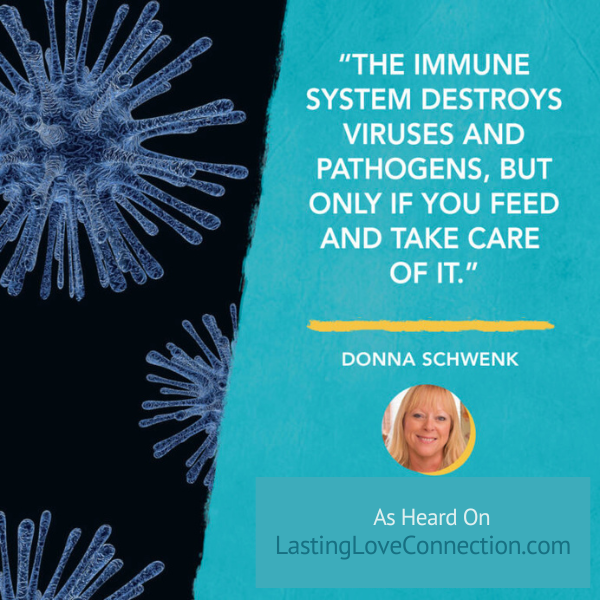
Donna Schwenk
It’s not just about being healthy yourself. Just by having a healthier microbiome, you’ll affect that baby you’re holding in your arms.
Kamala Chambers
I would love to hear more about the benefits people or those you know of experience from eating cultured foods.
Donna Schwenk
It’s ridiculous. I’ve never seen anything like it. It just goes on and on, and there are stuff I learn every day.
Somebody told me the other day, and I had no idea these foods would help.
Benefits Of Cultured Food
Donna Schwenk
In the beginning, I decided I wasn’t going to tell everybody. Because they’d thought I was crazy, like having living things fermented on my counter. However, I couldn’t stand it because my daughter had food allergies, and she healed them by having cultured food in every meal.
So I shared this with my friends because I couldn’t stand to see their kids suffer – and they got better. Then my other friend’s little boy had asthma, he got rid of his asthma inhaler. And then, her husband got rid of his acid reflux. Also, somebody’s cholesterol normalized, and then everybody stopped getting colds, flu, and sick all summer, and they went through the whole winter and did not get anything.
I saw people with kidney functions improved. When you have enough good bacteria, it eats the toxins in the urea that clean up the kidney problems. So she didn’t have to go on dialysis. I had one guy that had hepatitis that was so bad. He thought he was going to die, and he brought his whole life back.
These are all in my Lives Touched page on my website. You can read the stories yourself. It’s astounding, and I have a new one I had never heard of. A lady had venereal disease for 13 years, and it was awkward. She had flare-ups every month, and they were awful. She had been molested, I guess. It’s what happened. It’s a very sad story.
The Power Of Cultured Food
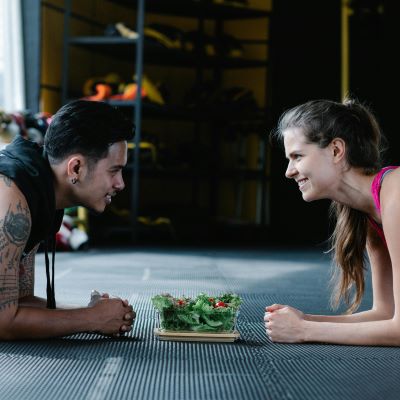
Donna Schwenk
I think it was 13 or 20 years since she’d had it. I can’t remember now. But after having this Kefir every month, she wasn’t having flare-ups anymore and said it was a miracle. It changed her whole life. It changed her marriage. Because she wasn’t living in fear of these terrible side effects that she was getting from having this disease. It’s so amazing, all the things that it does.
I’m just learning about all of them. I’ve been doing it for 15 years and get emails from people every week. I’ve often told people they wouldn’t believe me if they got all this stuff. They heard all the stories and the wonderful things it’s helped. But it makes sense because:
You and I are bacteria, and we’re a hundred trillion bacteria. Bacteria are in us for a reason. They’re here to help us live healthy lives as long as we take care of them.
Luis Congdon
It’s really incredible to hear that.
We believe that you take care of the body and the mind. You don’t have to do crazy things, like go see traditional doctors and be completely medicated, and you don’t have to suffer. That’s one of the reasons we’ve created this show and brought you on.
We know the power of cultured foods. We’ve been experimenting with them for several years now. At first, I was a little reluctant because these things looked kind of weird. They smell weird. Nobody’s eating them, or if they’re so great, why aren’t other people using them? I can attest to how awesome they are.
Does Cultured Food Help With Weight Loss?
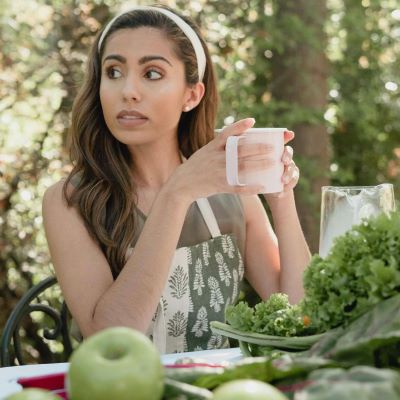
Luis Congdon
One last question here before we wrap up. I think this is something that’s already been answered. However, at the same time, I know it’s a question that may help convince or push people over the edge a little bit.
A lot of people are interested in fitness, losing weight, and having the ideal physique. Do cultured foods help with weight loss? Do they stop hunger pangs or help us reduce our need for some of those bad, unhealthy foods? Can they help with weight loss in the body that way, too?
Donna Schwenk
Yeah, they do. If you can think about feeding your microbes, they take care of that for you.
They eat fiber, which we can’t digest. They love soluble fiber because there are different types of fiber. They eat that, and it grows. What happens is that it grows and multiplies, reducing your blood sugar. It reduces inflammation. You’re less hungry.
If you feed them, you’re not as hungry. You’re nourished because they’re nourished, and they control your cravings. If you have cravings for sugars, fats, and processed foods. It’s because you have a microbiome that you have fed like that, and that’s what they crave.
You’ve noticed that as you feed them healthy fruits and vegetables. You change and get more of those microbes, and you have less of the other. It’s so amazing to watch, and you could play around with it. But when I go to the grocery store, I think, “Okay, my microbes are like that, and they’re like that.” Because they take care of me if I take care of them. And the interesting thing about all this is that, in the very beginning, I was sick.
Cultured Food Cures Diseases
Donna Schwenk
I had diabetes. I had high blood pressure. My daughter’s had irritable bowel. We had all these problems, and I didn’t know the answers to them. My doctors were saying, “Well, you got diabetes. It runs in your family, and I had both kinds of diabetes in my family. I had all these things, and this is just genetics. It made me mad because I thought, “I don’t want to get treatments just because of this.” I decided I was going to find an answer.
The most wonderful thing is that I never expected the answer that would come to me in terms of food. But it’s something that I love that would make me pay attention. These microbes that sit on my counter inside my jars changed my food; I ate them. Then, they changed me so miraculously that it made me feel loved. It made me feel cared for. It started to affect every area of my life. I went from lying on the couch being so sad to feeling like I didn’t even recognize my life.
Now, I have a business, and I teach classes. I never wanted to be an author before. I didn’t know how to write a book, and now, I have two best-sellers, and it just blew my mind.
Changing what you eat will not just change your body. It will change your entire life because you feel good. When you feel good, you do good. And change happens to everybody around you. It’s contagious.
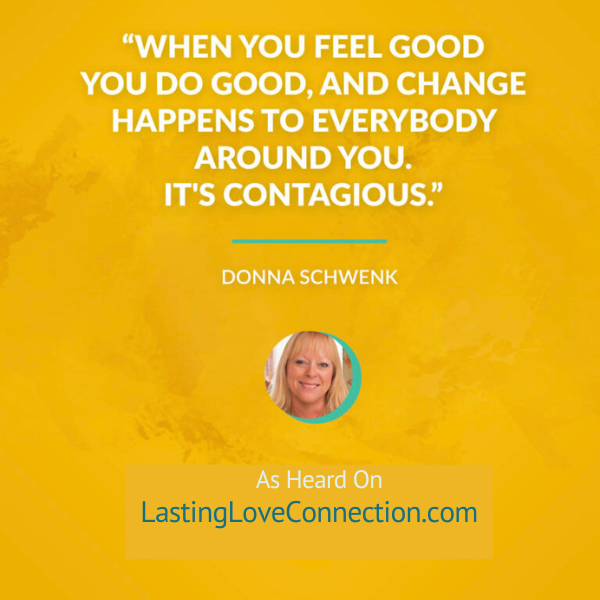
Cultured Food Helps You Change Your Entire Life
Luis Congdon
I really can feel that energy. It’s so powerful to hear you talk about it. You know your subject matter very well, and you know it so deeply. It’s not just in your head but in your heart and in your gut.
I really appreciate you sharing your story and how amazing it is to watch this energy and this knowledge pour out of you.
Donna Schwenk
Well, when something changes you so dramatically, you pay attention. I never want to go back to that life. I wasn’t living. I was existing, and I wanted so badly to feel good. I am just so surprised that it would come in the form of these little, tiny, invisible microbes. The tiny creatures that live inside of me that I can’t even see, but they’re there, and they care about us.
All they care about is you. They’re living inside you, and when you take them, you connect with them. It’s the greatest secret ever. It’s a gift that we all have that nobody knows about, and that’s my job. Nobody loves microbes like I do. It’s crazy, but that’s my little piece of the world, where I can help share what has made me well with others and hopefully change them, too.
Kamala Chambers
I have such deep gratitude to Donna of Cultured Food Life for coming on and blessing us all with this information about cultured foods. We are thankful for her educating us on how we can all add a little bit of culture to our meals. This will help us experience more health, mental clarity, and emotional stability.
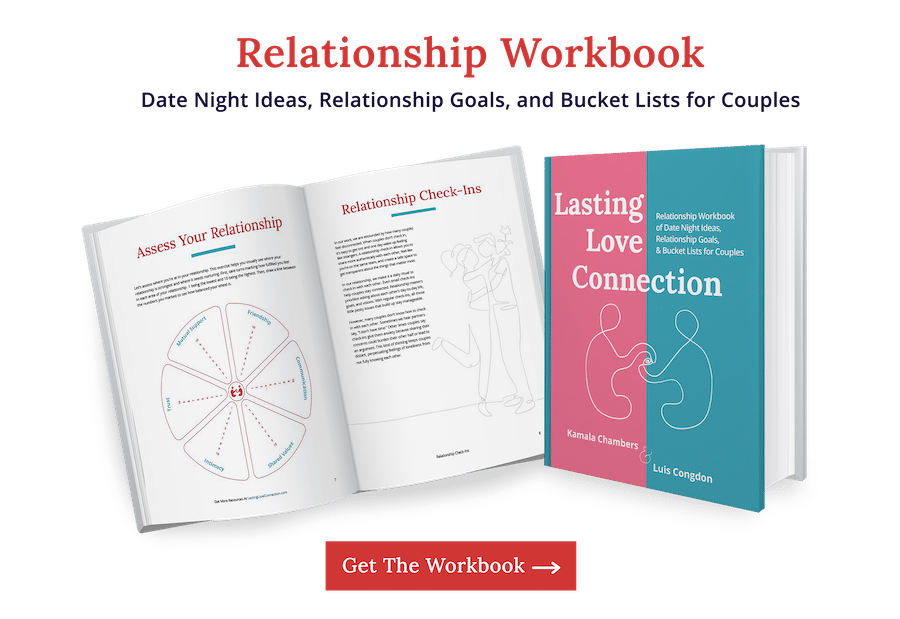

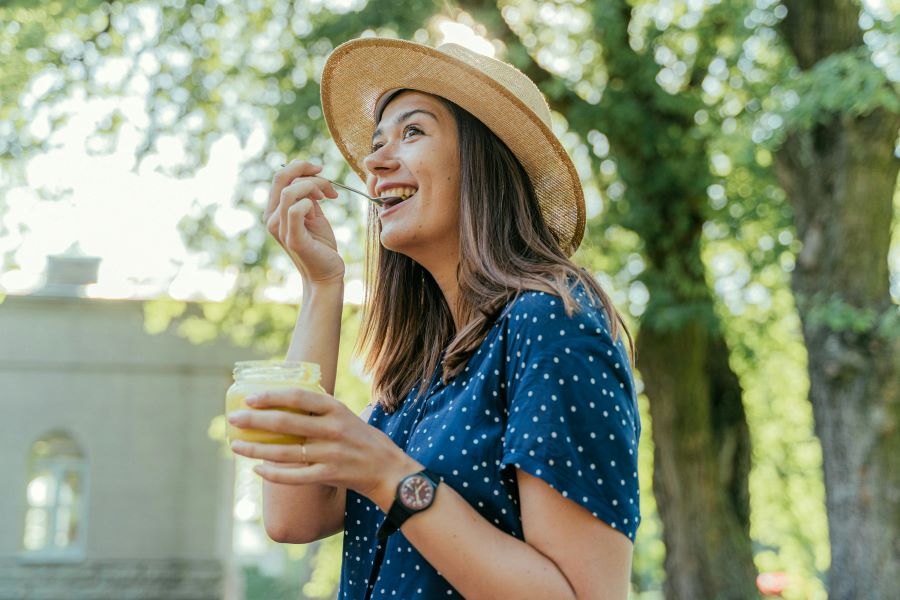




0 Comments